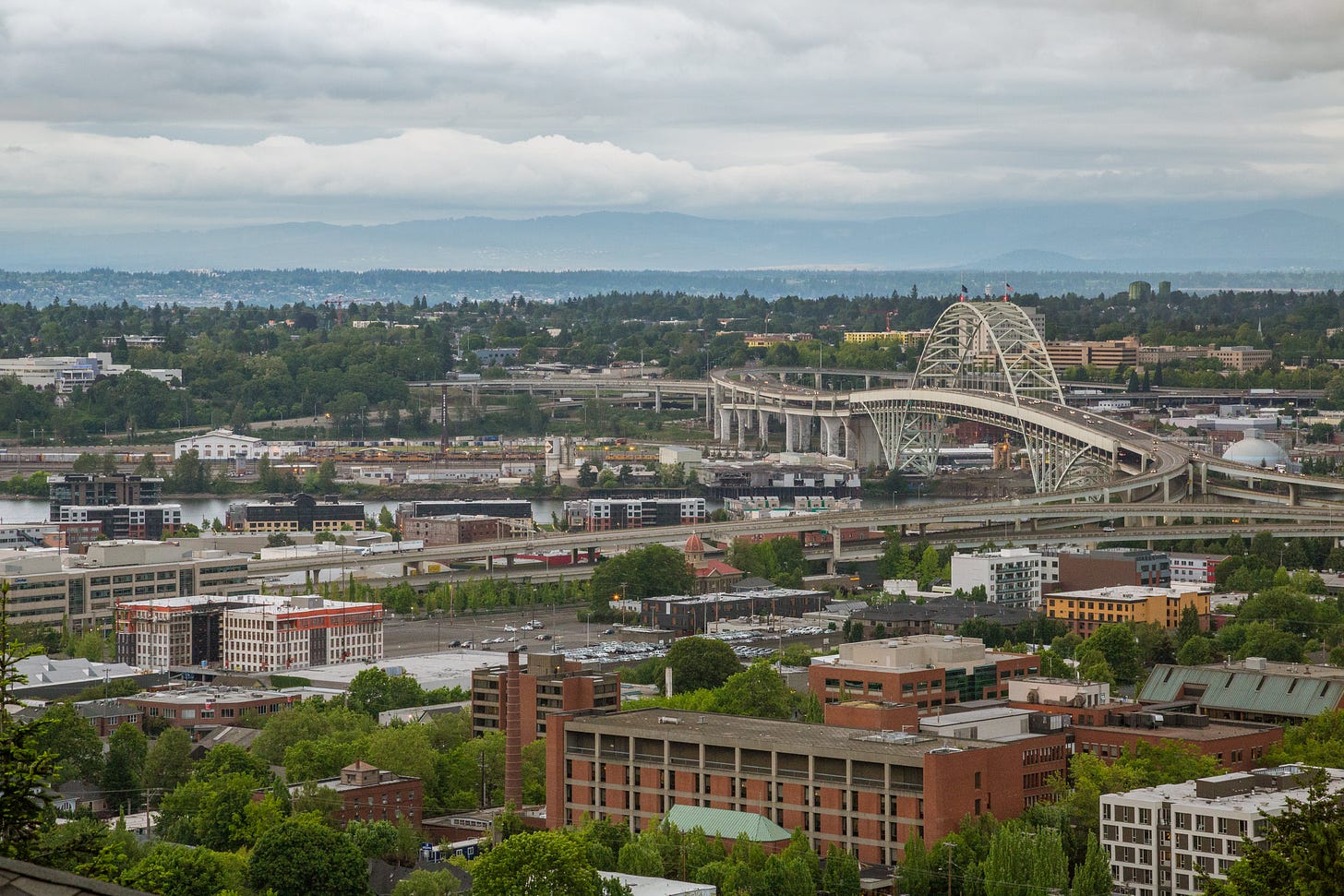The Way: Community Focus for ODHS, the Trauma of Homeless Women in Portland, and Holding County Clerks Accountable after the May Primary
Op-eds from Ben Sand (The Contingent), Scott Kerman (Blanchet House), Gary Conkling, and Mark Hester. PLUS, Oregon's tax system is not progressive; bringing federal dollars to rural Oregon; and more!
Thank you for reading The Oregon Way! If you like our newsletter, please share it with a friend.
This Week on The Oregon Way:

1. Community-Based Solutions are the Future of Human Services in Oregon
Ben Sand, CEO of The Contingent
June 17, 2022
Problem: The Oregon Department of Human Services serves over 1 million people every year (1 in 4 Oregonians), but its employees are running systems inadequate for the task.
Solution: The next governor should empower ODHS director, Fariborz Pakseresht, to reimagine one of the most important agencies in Oregon’s state government. And the legislature should give him the resources to do it. Sand proposes that community-based initiatives focused on proactively caring for neighbors be first among Pakseresht’s reforms to modernize the department.
Why This Matters: Oregon allocated more than $4.5 billion for the Department of Human Services in the 2021-2023 budget. That is the second largest line item in the state budget behind the school fund. The result is an office offering far-reaching services across the state. Still, recent reporting highlights the inefficiencies and delays that come with state government programs. Sand proposes smaller, local programs that are more accountable and accessible to the people they serve. Ultimately, this could be a cheaper, more proactive way of providing human services.
2. Women Experiencing Homelessness in Portland are Fighting to Survive
Scott Kerman, Executive Director of Blanchet House
June 24, 2022
Problem: Women experiencing homelessness are highly vulnerable. They are under constant threat of harassment, theft, and assault, exacerbating pre-existing mental illness and leading many to act aggressively as a way to defend themselves.
Solution: Blanchet House has launched a peer support program funded by Multnomah County. More programs and resources are needed to meet women where they are with the sympathy and expertise to serve them well.
Why This Matters: Portland is more aggressively relocating homeless camps off its city streets. Advocates say that this retraumatizes the most vulnerable, sometimes taking away their few belongings. Blanchet House and its peer support program could serve as a model for how to make people feel safe and open to the services they are being offered.
3. Gary Conkling and Mark Hester offer two responses in the wake of the Clackamas County’s May primary fiasco.
Conkling argues that the most straightforward way voters can respond to Sherry Hall’s blunders is to vote her out.
Hester says the Clackamas County and others should make reforms to hold clerks accountable. He offers three suggestions:
Term Limits for Clerks
Better Define Roles and Responsibilities
A Process for Removal
Why This Matters: Following the May primary, officials and voters in Clackamas County have been asking whether an appointed elections manager would be better than the current elected clerk. A handful of counties have already made the change. But in the hurry to make big changes, Conkling and Hester’s columns offer other solutions that may be more immediate and pragmatic.
Call Back:
Scott Kerman last wrote for us in January. In his op-ed, he explained how trauma is the cause of homelessness and why understanding that fact is essential to getting people off the street. Check it out here.
Other Ideas:
1. Oregon’s “Progressive” Income Tax is Among the Country’s Flattest
Jeff Newgard | Peak Policy | June 17, 2022
Problem: Oregon taxes the income of an individual making $9,200 at the same high rate (8.75%) as it taxes the income of an individual making $124,999. Oregon’s tax system is essentially a flat tax for this broad band of individuals and families ranging from those living in poverty to the upper middle class.
Solution: To make Oregon’s tax system more progressive, Newgard says the legislature should look at Oregon’s Federal Tax Liability Subtraction. It allows Oregonians to write off a portion of their federal tax liability. Oregon is one of only three states with such a deduction. If the legislature repealed the subtraction, it would free up the revenues to pay for tax cuts for lower-income Oregonians.
Why This Matters: Oregon has a reputation as a progressive state. In its appearance, Oregon’s tax system has a progressive structure. But most Oregonians (nearly 74%) are taxed at the same rate. If Oregon wants to compete with other states to lure people to live and work here, Newgard invites the legislature to look at its tax system.
2. Policy Brief: Can New Federal Dollars Help Oregon’s Rural Economies Grow? Maybe.
Jennifer Groth, Director of Policy and Partnerships at Rural Development Initiatives, Inc. | Oregon Business | May 20, 2022
Problem: Historic levels of federal investment are coming to Oregon, but these funds will only come through the hard-to-navigate grant writing process. The communities in Oregon that would most benefit from these dollars–rural communities–often lack the expertise and resources to go through this burdensome and costly process.
Solution: In 2021, the legislature created the Oregon Rural Capacity Fund, allocating $500,000 at the time. This fund has helped small communities pay for grant writing services they would not have been able to afford otherwise. This money will not last forever. Groth argues that rural communities will need sustained support from the state to pay for these services and embed these skills in these communities for the long term.
Why This Matters: While much attention is on Portland and its surrounding counties, rural Oregon faces significant challenges, from drought in southern Oregon to water contamination in eastern Oregon. There is a historic opportunity in American Rescue Plan and Bipartisan Infrastructure Law to bring funds to these disadvantaged communities. It is crucial, Groth argues, that the resources are there to help these communities win these funds because federal money will not wait for us.
Also Noteworthy:

1. In Portland, Oregon, the Paths to Homeownership Are Multiplying
Michael Andersen | Dwell | June 22, 2022
As Portland deals with a housing crisis, deregulation to spur new development is inspiring new ideas and innovations in city housing. Today’s housing crisis is already defining what the city’s housing will look like in a decade.
2. Editorial: Measure to change Portland city government needs to prove its viability
The Oregonian Editorial Board | OregonLive/The Oregonian | June 19, 2022
The Oregonian Editorial Board expressed skepticism about the Portland Charter Commission’s proposed changes. They say it has too many unproven reforms with too fast a timeline.
3. Opinion: Struggling under new mandates, Oregon’s farms need Oregonians’ support
Angela Bailey, President of the Oregon Farm Bureau | OregonLive/The Oregonian | June 15, 2022
As Oregon’s farmers face historic climate disruptions, Bailey argues that the Legislature’s new regulations on labor are overburdening small farmers. Bailey suggests that large commercial farms in other states could outcompete Oregon’s small family farms unless the state gives some relief.
To Do:
Read the latest edition of the Liftoff. Ben and Alex cover the (many) upcoming gubernatorial debates, the growing national interest in our congressional races, new legislative committee leaders, and how Nick Kristof is crowdsourcing his ethics decisions.
Listen to the latest episode of the Oregon Bridge. Ben and Alex talk to Les Zaitz about his legendary reporting career, the future of local journalism, and his success as a media entrepreneur.
Tips? Feedback? Ideas? Corrections? Let us know how we can improve!
Thank you for reading.
If you value our content, please become a paying subscriber today. Your support will help us grow and offer more opportunities to this community. It’s just $10 a month!





Liberals always want to raise more taxes and give more handouts. Oregon is a failed state with liberal control.